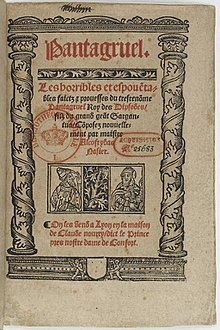
Back غارغانتوا وبانتاغرويل Arabic Qarqantüa və Pantaqrüel Azerbaijani Гарганцюа і Пантагруэль Byelorussian Гаргантюа и Пантагрюел Bulgarian Gargantua a Pantagruel Czech Gargantua und Pantagruel German Γαργαντούας και Πανταγκρυέλ Greek Gargantua kaj Pantagruel Esperanto Gargantúa y Pantagruel Spanish Gargantua eta Pantagruel Basque
 Title-page of a c. 1532 edition of Pantagruel | |
| |
| Author | François Rabelais ("Alcofribas Nasier") |
|---|---|
| Original title | Les Cinq livres des faits et dits de Gargantua et Pantagruel |
| Translator | Thomas Urquhart, Peter Anthony Motteux |
| Illustrator | Gustave Doré (1854 edition) |
| Country | France |
| Language | Classical French |
| Genre | Satire |
| Published | c. 1532 – c. 1564 |
| Published in English | 1693–1694 |
| No. of books | 5 |
The Five Books of the Lives and Deeds of Gargantua and Pantagruel (French: Les Cinq livres des faits et dits de Gargantua et Pantagruel), often shortened to Gargantua and Pantagruel or the Cinq Livres (Five Books),[1] is a pentalogy of novels written in the 16th century by François Rabelais.[a] It tells the adventures of two giants, Gargantua (/ɡɑːrˈɡæntjuə/ gar-GAN-tew-ə, French: [ɡaʁɡɑ̃tɥa]) and his son Pantagruel (/pænˈtæɡruɛl, -əl, ˌpæntəˈɡruːəl/ pan-TAG-roo-el, -əl, PAN-tə-GROO-əl, French: [pɑ̃taɡʁyɛl]). The work is written in an amusing, extravagant, and satirical vein, features much erudition, vulgarity, and wordplay, and is regularly compared with the works of William Shakespeare and James Joyce.[2][3][4] Rabelais was a polyglot, and the work introduced "a great number of new and difficult words ... into the French language".[5]
The work was stigmatised as obscene by the censors of the Collège de la Sorbonne.[6] In a social climate of increasing religious oppression in the lead up to the French Wars of Religion, contemporaries treated it with suspicion and avoided mentioning it.[7]
"Pantagruelism", a form of stoicism, developed and applied throughout, is (among other things) "a certain gaiety of spirit confected in disdain for fortuitous things"[8] (French: une certaine gaîté d'esprit confite dans le mépris des choses fortuites).
- ^ Les Cinq livres (The Five Books) or Les Cinq livres des faits et dits de Gargantua et Pantagruel (The Five Books of the Deeds and Sayings of Gargantua and Pantagruel) are shortened forms referring to the full title carried by the earliest publication into a single volume of all five novels of the pentalogy, namely Les Œuvres de Me François Rabelais, docteur en Medecine, contenant cinq livres, de la vie, faicts, & dits heroïques de Gargantua, & de son Fils Pantagruel (Lyon, Jean Martin, 1565 [antedated 1558]), which translates as The Works of Master François Rabelais, Doctor of Medicine: Containing Five Books of the Heroic Lives, Deeds and Sayings of Gargantua and His Son Pantagruel.
- ^ Rabelais, François (1994). Gargantua and Pantagruel: translated from the French by Sir Thomas Urquhart and Pierre Le Motteux; with an introduction by Terence Cave. Translated by Thomas Urquhart; Pierre Le Motteux. Everyman's Library. p. xii. ISBN 978-1-85715-181-7.
- ^ Rabelais, François (1999). The Complete Works of François Rabelais: translated from the French by Donald M. Frame; with a foreword by Raymond C. La Charité. Translated by Donald M. Frame. University of California Press. pp. xlii–v. ISBN 978-0-520-06401-0.
- ^ Rabelais, François (2006). Gargantua and Pantagruel: Translated and edited with an Introduction and Notes by M. A. Screech. Translated by M. A. Screech. Penguin. pp. xvii–iii. ISBN 978-0-14-044550-3.
- ^ Bakhtin 1984, p. 110
- ^ Rabelais, François (1952). "Biographical Note". In Hutchins, Robert Maynard; Adler, Mortimer J. (eds.). Rabelais. Great Books of the Western World. Vol. 24. Translated by Urquhart, Thomas; Motteux, Peter. Chicago: Encyclopædia Britannica, Inc.
- ^ Le Cadet, Nicolas (2009). Marcel De Grève, La réception de Rabelais en Europe du XVIe au XVIIIe siècle, Cahiers de recherches médiévales et humanistes, Comptes rendus (par année de publication des ouvrages). Accessed 22 November 2010.
- ^ Rabelais, François (1999). The Complete Works of François Rabelais: translated from the French by Donald M. Frame; with a foreword by Raymond C. La Charité. Translated by Frame, Donald M. University of California Press. p. 425. ISBN 978-0-520-06401-0.
Cite error: There are <ref group=lower-alpha> tags or {{efn}} templates on this page, but the references will not show without a {{reflist|group=lower-alpha}} template or {{notelist}} template (see the help page).